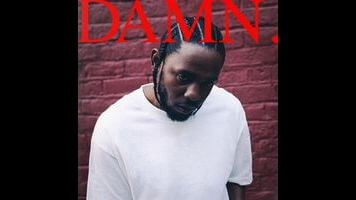Kendrick Lamar takes on all comers with the sharp, streamlined Damn.

Unlike some of his Compton rap forefathers, Kendrick Lamar has rarely had to struggle for respect. He’s reached a level of acceptance and prestige almost unimaginable for any rapper a generation ago. Music publications and fans alike herald him as one of the most significant artists of his generation. The Grammys have already honored him with more than 20 nominations, including a Best Rap Album trophy for 2015’s To Pimp A Butterfly—an album even then-President Barack Obama hailed as the year’s best. The world generally respects what he has to say.
Yet on Damn., Lamar’s magnificently streamlined latest, he can’t stop obsessing about some of the only people who don’t. After his 2016 Grammys performance, a Fox News panel mocked Butterfly’s civil rights anthem “Alright,” rolling eyes at a line about police violence: “And we hate po-po / Wanna kill us dead in the street for sure.” It’s hardly the worst a rapper has ever been treated by the media—dismissing other points of view is just what Fox News does—yet the segment stuck in Lamar’s craw, so much so that he pins the soundbite to the front of the album, the way Ice Cube used to air his own bad press on his records. He cycles back to the exchange throughout the record, fixating particularly on Geraldo Rivera’s verdict: “This is why I say hip-hop has done more damage to young African-Americans than racism in recent years.”
You can see why the criticism rankled him. To boil a song about uplift down to one provocative line, as if that were its primary message; to insinuate that an artist like Lamar would speak on a topic as loaded as police violence without considering his words; to have a terrifying truth about the black experience tsk-tsked away by the clown from Al Capone’s vault—it’s an insult not just to Lamar’s intelligence but his entire value system, and he pushes back hard. “Somebody tell Geraldo this nigga got some ambition,” he snaps on “Yah,” mispronouncing Geraldo’s name for extra shade.
If he’s punching down by using one of the year’s biggest albums to rebut some cable news panelists, so be it: This is a newer, more impulsive Kendrick than the sage observer of Butterfly. On Damn., Lamar stops presenting himself as a wizened philosopher and carries on like an ordinary human being, without the overthinking and over-explaining that defined his previous albums. In the past, he couldn’t even toss off a throwaway boast about his dick without self-examining what it might say about his ego, but here he’s finally given himself the luxury to talk shit just for the sake of it. “Last LP, I tried to lift the black artists,” he huffs on “Element,” one of three tracks voluptuously produced by Mike Will Made It, “But it’s a difference between black artists and wack artists.” In other words, he’s through sermonizing. Now he just wants to rap.
 Keep scrolling for more great stories.
Keep scrolling for more great stories.
